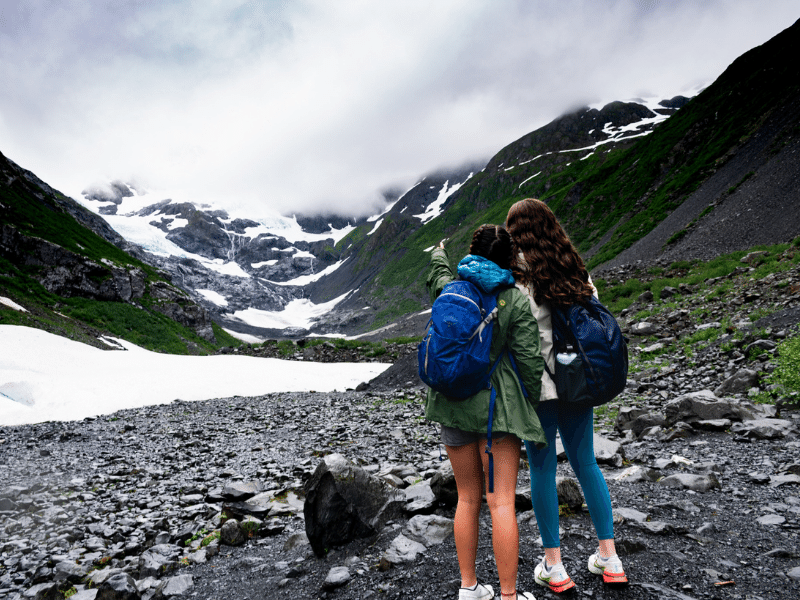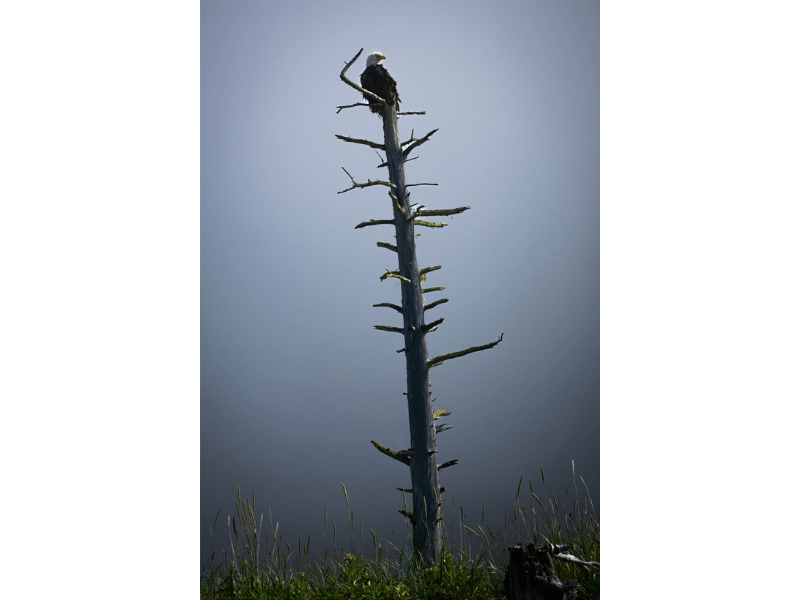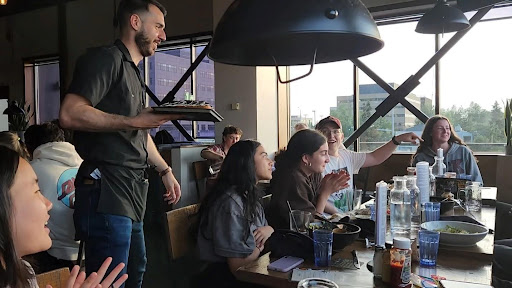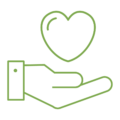These “Lessons from Alaska” blog posts are written by Putney leader Braelei Hardt, who recounts several pivotal moments during their time leading our Middle School Alaska program and our Columbia Climate School program in Alaska. Please enjoy their accounts of these transformational experiences. Click these links to see the previous posts:
Off the Grid, On the Table
At the beginning of our program, after our orientation, we had gathered to discuss our upcoming tech fast. As on all Putney trips, the students were expected to forgo the internet, social media, and texting for seven days. The proposal of a technology fast was met with apprehension. This was in the shadow of the pandemic, after all. The devices, which had been their constant companions through lockdowns and remote schooling, were relinquished with hesitant hands.
In the following days, though, their initial restlessness soon gave way to deeper engagements with their surroundings, and to each other. In the raw and immersive beauty of Alaska’s wilderness, they debated the burn scars on the land, assessed local politics, marveled at the wildlife, and shared stories of their lives—and perhaps more importantly, their hopes for the future.
The conclusion of the technology fast approached more quickly than we expected, and we gathered in the shared confines of our hostel. The fast was a boundary we had all respected, albeit some more reluctantly than others. It was then that the students, perhaps inspired by the rawness of the land and the richness of their shared experiences so far, convened a discussion that marked a pivotal moment in our adventure.

Gathered around a rustic wooden table, the students initiated a conversation that was both mature and forward-thinking; completely self-led as we leaders sat back and listened. The subject at hand was not whether to reintegrate their phones back into their lives, but how to do so mindfully. We watched from the corner, silent observers, as they navigated this uncharted territory with a sense of purpose and mutual respect.
One student, her voice steady and thoughtful, proposed the idea: “What if we set our own rules for phone use? We’ve all seen how different—and better—these last days have been without them.” Nods and murmurs of agreement rippled through the group.
Another added, “We can still enjoy these last few days together if we’re not constantly on our phones.”

What followed was a democratic weaving of ideas and suggestions, each student contributing to their self-imposed guidelines. They agreed that phones would remain largely out of sight, not to be a barrier between them and the world. They would not be used in public spaces, allowing the beauty of Alaska and the company of each other to remain the focal points of their remaining time. Messages and social media would wait until the evenings, a compromise that acknowledged the pull of their digital lives but set boundaries to protect the sanctity of their real-world connections.
This self-governance highlighted their growth over the days spent disconnected. They had tasted the richness of life unfiltered by likes and notifications, and they were not ready to relinquish it entirely. It was a decision born from a newfound appreciation for the present, for the deep conversations sparked under sun-warmed skies, for the laughter shared over campfire stories, for the moments of introspection allowed by enjoying solitude in nature’s embrace.
They strictly implemented these rules in the days that followed. Phones lay forgotten in backpacks and cabins, only retrieved when the day’s adventures were done. The effect was palpable—in their lively debates over dinner, in their attentiveness to the stories of the land, in the way they observed a caribou in the wild with unbridled—and fully attentive—fascination. They had created a space where the present mattered more than their virtual lives, where connections were forged not through Wi-Fi but through shared experiences and genuine human interaction.

On our final evening together, this student-driven ethos culminated in a moment of collective and spontaneous kindness that will forever remain etched in my memory. We gathered at a seafood restaurant in Anchorage, the air filled with the aroma of the ocean’s bounty and the buzz of shared stories. As we settled in, the students, by an unspoken agreement, placed their phones in a pile at the corner of our table. It was a decision that spoke volumes, a final affirmation of their commitment to experience these fleeting moments together, fully and without the digital distractions that had once seemed indispensable.
Our server for that evening was a young man in his twenties, his demeanor a blend of professionalism and the easygoing charm of Alaska and its visitors. As he took our orders, a few of the students struck up a conversation with him, their curiosity piqued by his friendly nature and unfamiliar accent. They learned he was an environmental engineering student out of Russia, working through the summer to save for college. He shared his aspirations with a candidness that invited empathy, his dreams resonating with the students’ own hopes and ambitions for a future with the world’s health in mind.
It was in this exchange, free from the barriers of screens and virtual notifications, that a plan began to take shape among the students. They called it “Operation Best Tip Ever.” One of them had learned from the waiter’s manager that positive reviews on the restaurant’s website translated into a small bonus for the staff. Quick calculations followed, and a realization dawned on the group: if each of them left a review, they could collectively contribute to a very significant bonus for the waiter. The decision was unanimous and immediate; phones were briefly reclaimed so that each student could leave our wonderful waiter a wonderful review.

Our server brings in a birthday cake for one of our students at 49th State Brewing. This cake was made in secret by the other students. Anchorage, Alaska, 2023. Credit: Braelei Hardt
The young server, returning to our table later, was greeted with a sea of smiling faces and the news of their gesture. Overwhelmed, his eyes glistened as he thanked the group and shared our celebratory cake with us. It was a scene of pure, unscripted humanity—a group of young people, once strangers to each other and to him, now connected by a shared act of kindness.
This interaction, simple yet profound, solidified my belief in the power of disconnecting from the digital world, and to instead strive to forge genuine connections in the real one. It was a moment that likely would have passed unnoticed in the presence of social media, with everyone absorbed in their personal digital spheres. But that night, the students’ last group decision was one of heartfelt generosity, a choice that reflected their growth and the values they had cultivated during our time together. Witnessing this act of kindness was a poignant reminder of the impact such experiences can have; not just in broadening horizons, but in nurturing empathy, compassion, and a sense of community that extends to those we might not otherwise see and friends.
Click these links to learn more about our Career program in Alaska and our collaboration with the Columbia Climate School.







